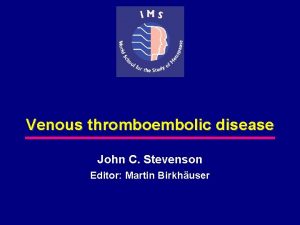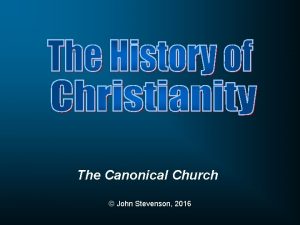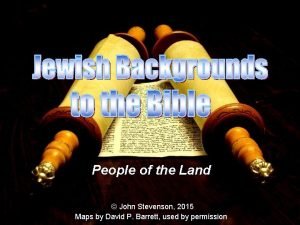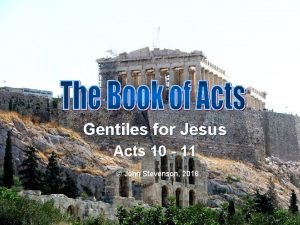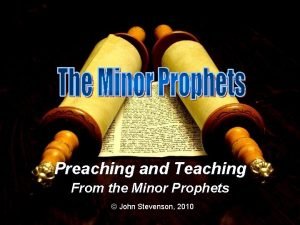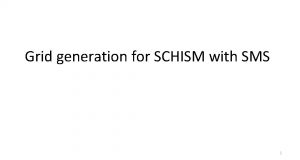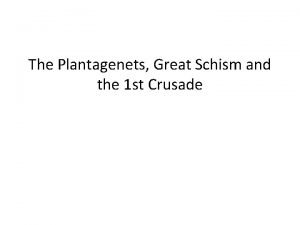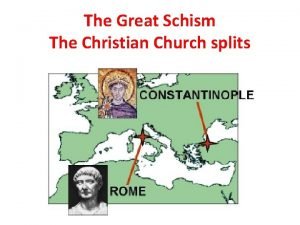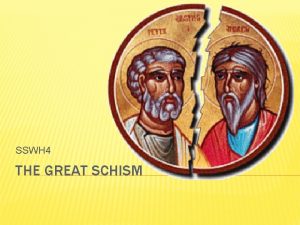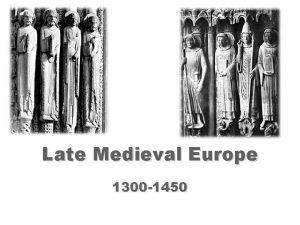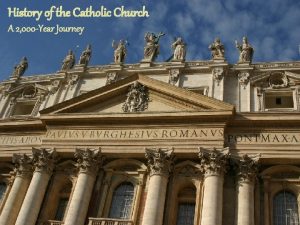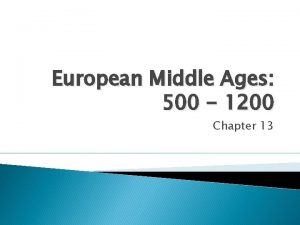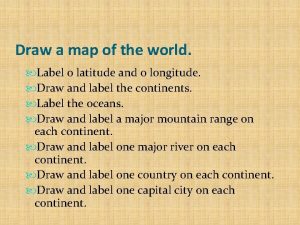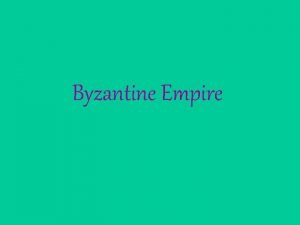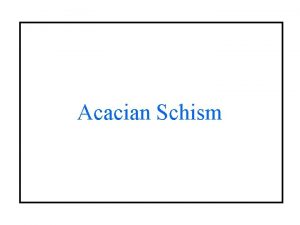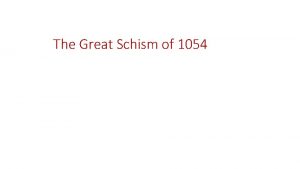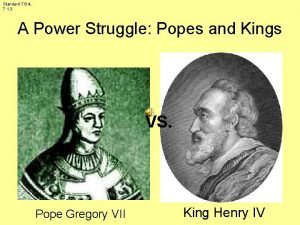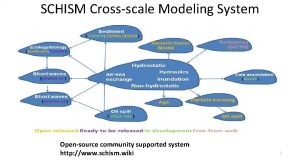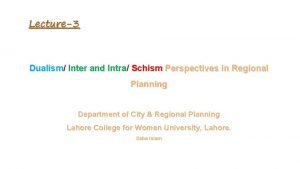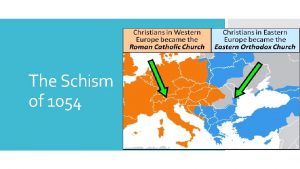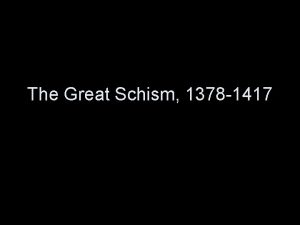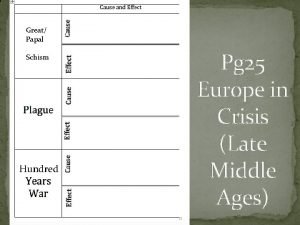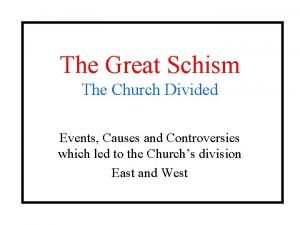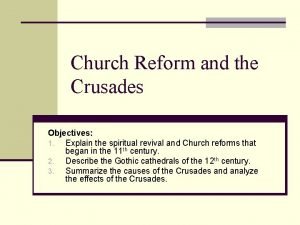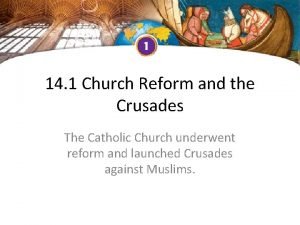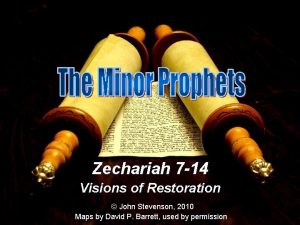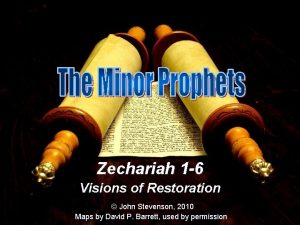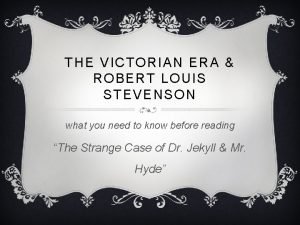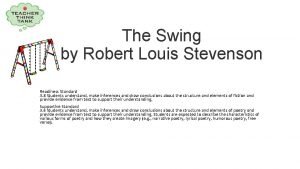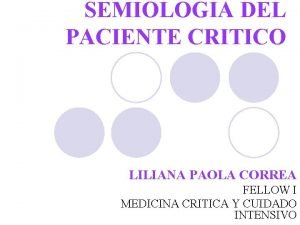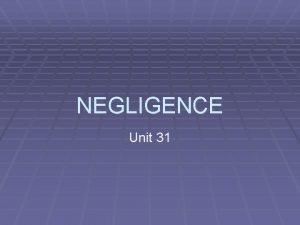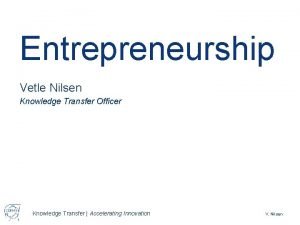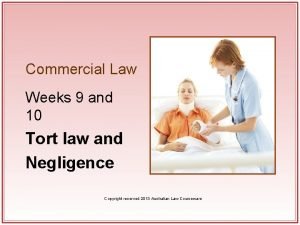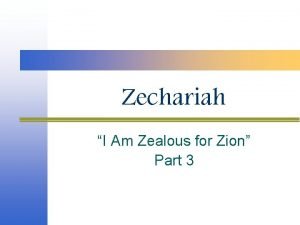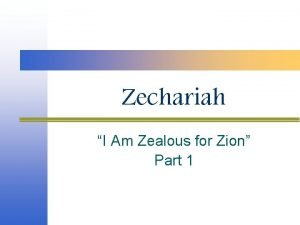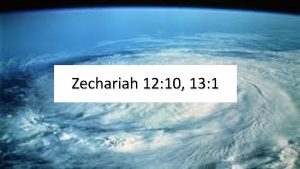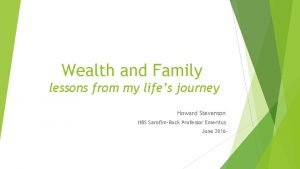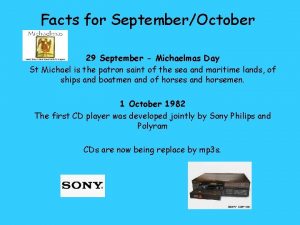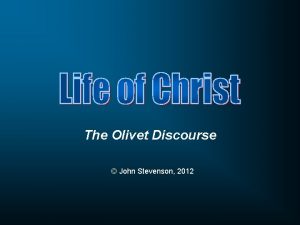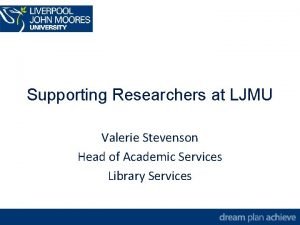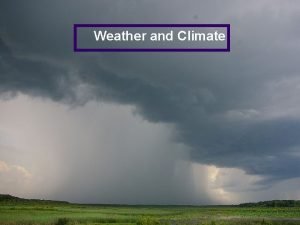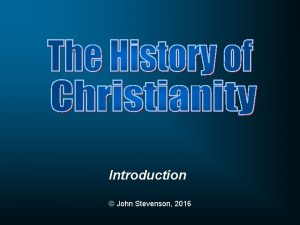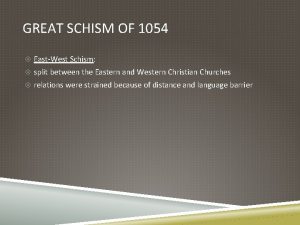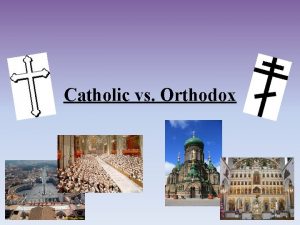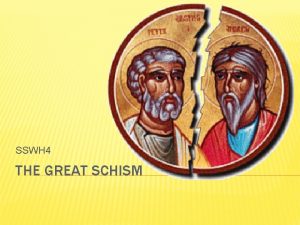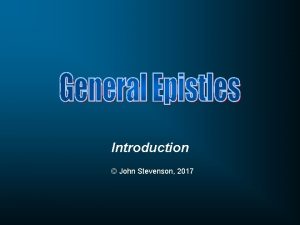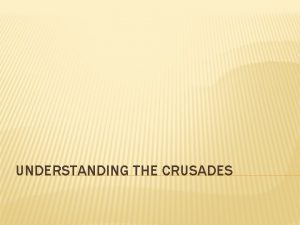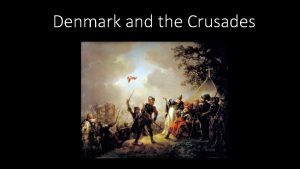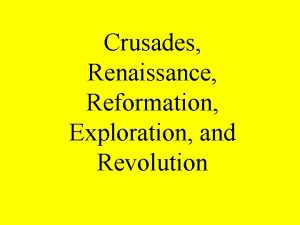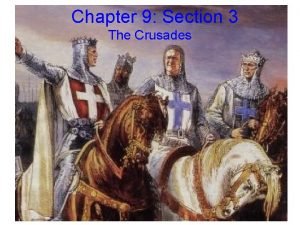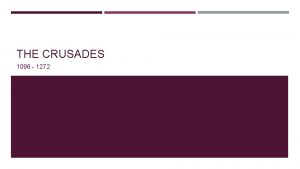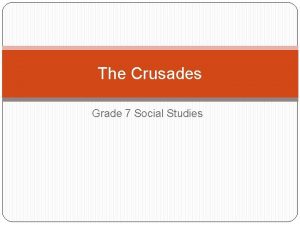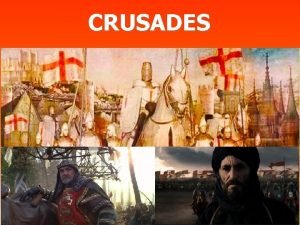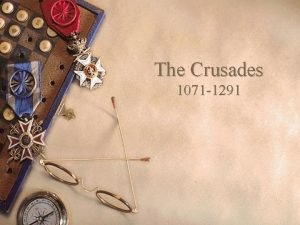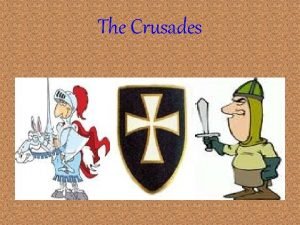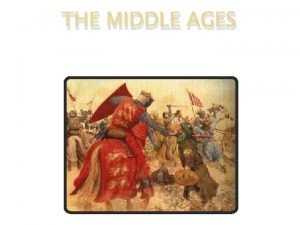Schism and the Crusades John Stevenson 2016 1

















































- Slides: 49

Schism and the Crusades © John Stevenson, 2016

1 500 The Ancient Church 1000 1500 The Medieval Church Early Middle Ages High Late Middle Ages 2000 The Reformed Church

Early Middle Ages High Middle Ages Late Middle Ages 500 - 1000 - 1300 - 1500 Gradual population growth Rapid population growth Population decline Warm Period Little Ice Age Climate Change

Early Middle Ages High Middle Ages Late Middle Ages 500 - 1000 - 1300 - 1500 Gradual population growth Rapid population growth Population decline Crusades Formation of nation states Gothic architecture Gothic & Renaissance architecture Barbarian invasions Romanesque architecture

● Rome Constantinople ● The Bishop of Constantinople shall have the primacy after the Bishop of Rome, because his city is New Rome. ― Canon 3, Council of Constantinople

● Rome Constantinople ●

Western Church Eastern Church is over the state State is over the church Pope is the final authority Church council is the final authority Theology is for theologians Theology is for everyone Celibacy demanded for nearly all positions Marriage permitted except for bishop Opposition to icons Veneration of icons

Western Church Adopted Filioque Clause Eastern Church Objected to the Filioque Clause

The Seven Church Councils of the Eastern Church Nicaea 325 Constantinople 381 Ephesus 431 Chalcedon 451 2 nd Constantinople 553 Explained the Trinity Explained the person of Christ 3 rd Constantinople 553 2 nd Nicaea 787 Icons

What was the rationale behind the Crusades?

Began in 1096 • Muslim invasion of Anatolia • Byzantine Emperor Alexios I appeals to Pope Urban II for mercenaries • Urban II’s call to arms

Began in 1096 • People’s Crusade: 90% of participants were general population – Massacre of Jewish communities – Warned by Alexios II – Crusaders annihilated by Turks

Began in 1096 • Baron’s Crusade – Nobles from France, Italy, Germany, and England – Assembled in Constantinople • Imposed oath – Siege of Nicaea

Began in 1096 • Baron’s Crusade – Siege of Antioch • Departure of Byzantines • Peter Bartholomew & Holy Lance – Siege of Jerusalem • Vision of Peter Desidarius • Kingdoms of Jerusalem, Tripoli, Antioch, & Edessa


• Monastic order of fighting knights • Charged with protection of pilgrims to Holy Land • Headquarters on Temple Mount in Jerusalem • Answerable only to the Pope

• Individual poverty, but banking resources • King Philip IV of France ordered their arrest and their possession taken (1306)

• Leaders tortured and burned at the stake • Rest of order disbanded and absorbed into various nations

1 st Crusade (1096 -1099) 2 nd Crusade (1145 -1149) Establishment of kingdoms: Jerusalem, Tripoli, Antioch, Edessa Attempt to retake Edessa fails 3 rd Crusade Recapture of Acre and Jaffa, but (1189 -1192) failed to recapture Jerusalem Crusaders sacked 4 th Crusade (1202 -1204) Constantinople Albigensian Crusade in southern France to stamp out Cathars who held to Crusade (1209 -1229) perfection & poverty

Children’s Crusade (1212) Children and bands of poor people attempt to march to the Holy Land

Children’s Crusade (1212) 5 th Crusade (1213 -1221) 6 th Crusade (1228) Children and bands of poor people attempt to march to the Holy Land Crusaders attacked Egypt but were defeated Frederick II of the Holy Roman Empire given Jerusalem

Children and bands of poor people attempt to march to the (1212) Holy Land 5 th Crusaders attacked Egypt but (1213 -1221) were defeated 6 th Crusade Frederick II of the Holy Roman (1228) Empire takes Jerusalem 7 th Crusade Attempt by Louis IX of France to (1248 -1254) take Egypt fails Children’s Crusade

How have the Crusades impacted our world?

Results of the Crusades • • Integration of Arabic learning Emphasis on the Classics Weakening of the Byzantine Empire Growing power of the Christian Church – Intolerance of other faiths – Increased emphasis on indulgences • Muslim advance into Europe slowed

What are the similarities and differences between the Crusades versus recent conflicts in Iraq and Afghanistan?

Francis of Assisi 1181 -1226 • Son of a cloth merchant • Served as a soldier • Taken prisoner and a year in captivity • Devoted himself to a life of poverty • Mendicant order

Francis of Assisi 1181 -1226 • Urban lifestyle • Church recognized order of Franciscans & ordained Francis as a deacon • Rejected having plans for the future • Haggling evangelism

Francis of Assisi 1181 -1226 • Travel to Egypt – Pilgrimage of nonviolence – Meeting with the Sultan – Permitted to preach to the people

Francis of Assisi 1181 -1226 “Let all brothers preach by their deeds. ”

What does Francis teach us about how we ought to live?

• Clerical authors: The chivalric romance • Courtly love • Knights protect the weak • Tournaments and jousting

Pope from 1198 to 1216 • Nobleman • Elected Pope at the age of 39 • Organized 4 th Crusade of 1198 – Took active hand in raising funds – Capture of Constantinople

Pope from 1198 to 1216 • Adopted the title “Vicar of Christ” • Recognized Franciscans • Albigensian Crusade against Cathars in Southern France

Pope from 1198 to 1216 “It is the business of the pope to look after the interests of the Roman empire, since the empire derives its origin and its final authority from the papacy”

Pope from 1198 to 1216 • Excommunicated King John of England over Archbishop of Canterbury • England accepted as papal fief • Condemned Magna Carta • Fourth Lateran Council

1215 • • • Canonized transubstantiation Ban on new orders Suspected heretics excommunicated unless proven innocent • Affirmed Filioque clause

1215 • Jews and Muslims excluded from public office and required to wear special clothing • Cathedrals ordered to provide training for clergy

1215 • Confession to a priest and Lord’s supper mandated once a year

Vita Apostolica • • Mendicants Urban order Heard confessions Pastoral in their engagement of people • Missionaries to Germany: Did not learn the language

Order of Preachers • Begun by Dominic de Guzman in 1215 • Founded to preach and combat heresy – Albigensians (matter is evil; spirit is good) – Inquisition • Intellectual emphasis

Franciscans Dominicans Sought to change the heart Sought to enlighten the mind Emphasis on how you live Emphasis on what you know

Died in 1179 • Dedicated to a religious life at age of six • Headed a Benedictine convent • Claimed visions that helped her to interpret Scripture • Preaching publicly

Died in 1179 • Corresponded with popes • Visions included a description of purgatory as the place where we pay the penalty for our sins

1122 - 1204 • Daughter of Duke of Aquitaine • Wife of King Louis VII of France • Joined 2 nd Crusade with her husband • Marriage annulled • Married future Henry II of England

1133 - 1189 Henry II of England Richard Lionheart Eleanor of Aquitaine Geoffrey John Lackland

1133 - 1189 • Dysfunctional family • Thomas Beckett – Archbishop of Canterbury

1133 - 1189 • Dysfunctional family • Thomas Beckett – Archbishop of Canterbury – “Who will rid me of this troublesome monk? ” • Richard Lionheart – Third Crusade

• John Lackland – French conquests in Normandy – Conflict with pope over archbishop – Magna Carta

 Dr john stevenson
Dr john stevenson Dr john stevenson
Dr john stevenson John stevenson syndrome
John stevenson syndrome Dr john stevenson
Dr john stevenson Dr john stevenson
Dr john stevenson Acts 10 11
Acts 10 11 John stevenson bible study
John stevenson bible study Transubtantion
Transubtantion San diego sms satellites
San diego sms satellites The great schism 1378
The great schism 1378 Seljuk
Seljuk Schism
Schism Effects of the great schism
Effects of the great schism Great western schism
Great western schism Great schism 1054
Great schism 1054 The great schism
The great schism Great schism of 1054
Great schism of 1054 Iraq
Iraq 1453-330
1453-330 Acacian
Acacian What was the deal breaker in the great schism
What was the deal breaker in the great schism Alamy
Alamy Schism model
Schism model Intra-elite schism
Intra-elite schism Great schism drawing
Great schism drawing What caused the great schism of 1378
What caused the great schism of 1378 Schism manual
Schism manual Schism
Schism Causes of the great schism
Causes of the great schism Stevenson and black 2007 inclusion spectrum
Stevenson and black 2007 inclusion spectrum Church reform and the crusades
Church reform and the crusades Chapter 14 section 1 church reform and the crusades
Chapter 14 section 1 church reform and the crusades Zechariah
Zechariah What are these
What are these Robert louis stevenson victorian era
Robert louis stevenson victorian era Till i can see so wide
Till i can see so wide Cuadrante de stevenson
Cuadrante de stevenson Donoghue vs stevenson summary
Donoghue vs stevenson summary Howard h stevenson
Howard h stevenson Donoghue v stevenson case summary
Donoghue v stevenson case summary Donoghue v stevenson case summary
Donoghue v stevenson case summary I am zealous
I am zealous Zechariah stevenson
Zechariah stevenson Zechariah stevenson murder
Zechariah stevenson murder Building a life howard stevenson
Building a life howard stevenson Ilona stevenson
Ilona stevenson Matthew 24 35
Matthew 24 35 Valerie stevenson
Valerie stevenson Peter stevenson compassion in world farming
Peter stevenson compassion in world farming Stevenson screen unit of measurement
Stevenson screen unit of measurement


